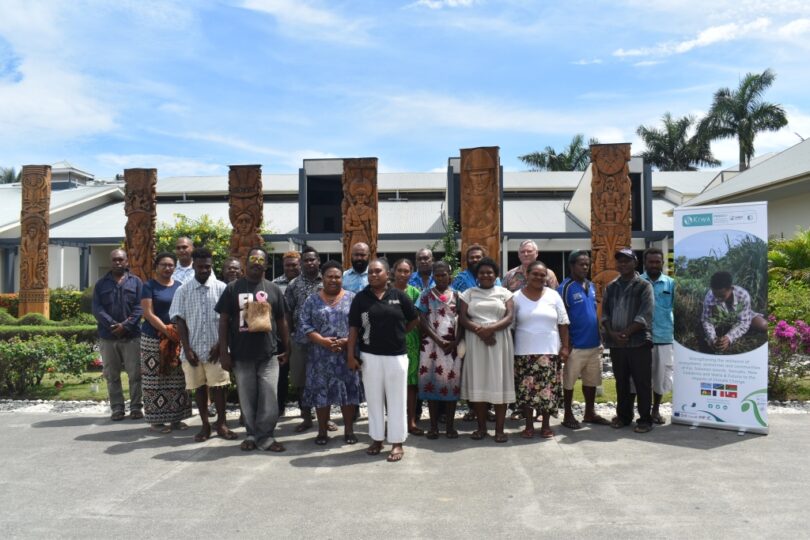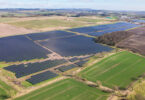The Pacific Ecosystem-based Adaptation to Climate Change (PEBACC+) Project for Solomon Islands started its inception workshop this week with key national partners and stakeholders in Honiara and Guadalcanal Province. The inception workshop formally launched the project and reconfirmed commitment of key partners to strengthen momentum by stakeholders in the implementation of the project.
The Kiwa PEBACC+ Project aims to develop, sustain, and institutionalise ecosystem-based Adaptation (EbA) and Nature-based Solutions (NbS) to climate change impacts and threats in targeted countries and territories.
In his opening remarks, Solomon Islands Ministry of Environment, Climate Change, Disaster Management and Meteorology Deputy Secretary, Mr. Chanel Iroi said, “The key objective of today’s inception workshop is to introduce the project and share lessons as well as see how the Kiwa PEBACC+ project may be able to build on or strengthen ongoing initiatives.
“The project will give us an opportunity to strengthen the resilience of ecosystems, economies and populations of Solomon Islands to the impacts of climate change. The Ministry of Environment remains committed in this partnership with SPREP in ensuring the successful implementation of the Kiwa PEBACC+ project in Solomon Islands over the project tenure,” said Mr. Iroi.
The Kiwa PEBACC+ project will build on lessons learned from the SPREP implemented PEBACC project funded by the German Government International Climate Initiative from 2015 to 2021, as well as building on the Pacific Adaptation to Climate Change and Resilience Building (PACRES) Project funded by the European Union with support from Monaco and the Swiss Confederation that supported implementation of the Central Business District Master Plan and the Honiara Botanical Garden Master Plan.
In the Solomon Islands, the Kiwa PEBACC+ Project will support ecosystem and forest rehabilitation activities and the Information Centre at the Barana Community Nature and Heritage Park; it will also support the Honiara Botanical Garden in landscaping and capacity development; as well as conduct provincial and local Ecosystem and Socio-Economic Resilience Analysis and Mapping (ESRAM) assessment and implement EbA options in Small Malaita and Maramasike Passage, Malaita Province.
Speaking at the opening of the National Inception Workshop, SPREP Director of the Island and Ocean Ecosystems Programme, Mr. Stuart Chape said, “In the recent SPREP meeting, national ministers expressed deep concern regarding the triple planetary crises of climate change, biodiversity loss, and pollution making the work of the Kiwa PEBACC+ Project an important initiative.
“We recognise the participation of key stakeholders, to enable learning, sharing of lessons and see how we may ensure this project builds on existing and past projects and initiatives. We also acknowledge project key funders, the Kiwa Initiative, and the French Environmental Facility for their support.
We reiterate that SPREP remains committed to this partnership to help you deliver outcomes of this project in the Solomon Islands,” added Mr. Chape.
Stakeholders represented at the inception workshop include the Solomon Islands Ministry of Provincial Government and Institutional Strengthening, Ministry of Agriculture and Livestock, Ministry of Forestry and Research, Ministry of Environment, Climate Change, Disaster Management and Meteorology, National Herbarium and Botanical Garden, The Nature Conservancy in the Pacific, and the Small Grants Programme under the UN Development Programme and Global Environment Facility.
The Kiwa PEBACC+ Project Inception Workshop started on Tuesday, 12 September 2023 with national stakeholders and continues today with key stakeholders from the Guadalcanal Province. The inception workshop for the Malaita Province is scheduled later in the month.
The project is a €5.8 million regional project implemented by SPREP and funded by the Kiwa Initiative through its donors the European Union, Agence Française de Développement (AFD), Global Affairs Canada, Australian Government Department of Foreign Affairs and Trade (DFAT) and New Zealand Ministry of Foreign Affairs and Trade (MFAT) – with co-financing from the French Facility for Global Environment (FFEM). This four-year project seeks to strengthen the resilience of ecosystems, economies and communities to the impacts of climate change in Fiji, Vanuatu, Solomon Islands, New Caledonia, Wallis and Futuna. The project will develop, sustain and institutionalise Ecosystem-based Adaptation to climate change in these five countries and territories.







